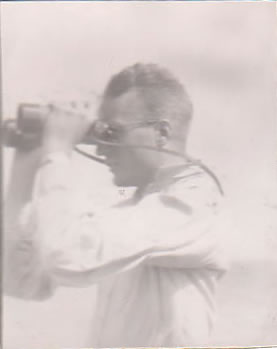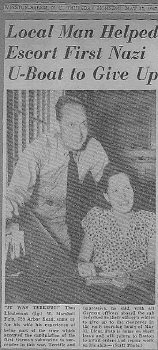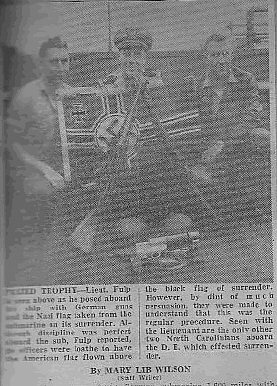fulp01.jpg

Lt. Fulp on the bridge looking through binoculars
Return to Photos
Bridge
fulp02.jpg

Newspaper Article,Photo of Fulp and his wife, at his parents’ home, which was also their residence at the time.
Caption: "It was terrific!" Thus Lieutenant (j.g.) W. Marshall Fulp, 729 Arbor Road, sums up for his wife his experience of being part of the crew which accepted the capitulation of the first German submarine to surrender in this war. "Terrific and impressive", he said, "with all German officers aboard the sub bedecked in their officer’s whites to give up to the destroyer in the early morning hours of May 11". Lieut. Fulp is home on short leave and will return to Boston to await orders and repair work on his ship. (Staff Photo.)
TEXT OF ARTICLE FROM WINSTON-SALEM (N.C.) JOURNAL, May 31, 1945:
Winston-Salem, N.C., Thursday Morning, May 31, 1945
Local Man Helped Escort First Nazi U-Boat to Give Up
by Mary Lib Wilson, (Staff Writer)
Escorting a surrendered German submarine 1,600 miles without knowing from one minute to another at what point it might choose to submerge, taking with it 19 of your enlisted men and two officers, is an experience long to be remembered.
It is one which Coast Guardsman Lieutenant (j.g.) W. Marshall Fulp of 729 Arbor Road will carry with him for a long while. Nor will he soon forget 2:30 in the morning of May 11 when the ship of which he as a crew member accepted the capitulation, without a shot being fired, of the first German sub to surrender in this war.
Since the D.E. crew were unfamiliar with the technique of navigating a German submarine, they deemed it wise to leave the navigation of the vessel to its original crew, and hope for the best. All was not left up to fate, however. Guns were trained on the sub, and at the first suspicious move, action would have been taken. But what of the American aboard her? A tricky situation at best.
While protecting a convoy off the Azores, the Coast Guard-manned destroyer escort of which the blond, handsome Winston-Salem boy was an officer, came upon the U-873. Surfacing, the sub commander, Kapitanleittenant Fritz Steinhoff, who later committed suicide by slashing his wrists with the lense of his eyeglass, explained that he was surrendering in compliance with the orders of Grand Admiral Doenitz.
Upon boarding the Nazi ship (the American prize crew of 19 enlisted men and two officers had boarded her and taken command in 50 minutes), the Coast Guardsmen found a stupid, sullen crew, an enormous amount of filth, case upon case of Canadian Club whisky, fine cheeses and a tremendous stock of other foods, Lieut. Fulp said. Precautions were taken to make it impossible for the Germans to scuttle the ship, and the prize crew was left aboard to bring the captive ship to a surrender point just outside of Portsmouth, where it was turned over to naval authorities.
In violation of unconditional surrender terms, the sub crew had destroyed all confidential papers and secret equipment. There was still nine torpedoes aboard ready for firing. Nazi officers reported, according to Lieut. Fulp, that since the submarine left Norway 42 days before, it had sunk one tanker off the shore of Nova Scotia. As a rule, he said, German subs have aboard 18 torpedoes, and whether or not the remainder had been fired is a moot question.
A taciturn crew they were, according to Fulp. They were reluctant to talk, and armed with little information as to the present status of the war. All they knew was that their fatherland had surrendered. One of their first questions: "Are the Russians in Germany yet?" Some were even under the impression that when they were taken to the camp in the States they would be released to return to Germany to fight the Russians. "After all," they reasoned, "we are no longer at war with you Americans."
There were interned after being taken from the submarine, and two days later the commanding officer ended his life. Whether his inherent naval pride (his father and grandfather had been in the German Navy), after he discovered that his was the first submarine to surrender, or dread of court martial for violation of surrender regulations, led to suicide could not, of course, be determined.
Complete co-operation and a spirit of humility on the return trip was found among the Nazis, save for a few whom Fulp terms "extremely arrogant."
German speaking members of the American crew were selected to board the Nazi ship and bring her into port. Coincidentally enough, one of the Coast Guardsmen by the name of Cogler discovered a third cousin among his Nazi prisoners.
This action was the first Lieut. W. Marshall Fulp had seen against the enemy, although his ship as credited with helping to sink another sub prior to this time.
He will return to Boston shortly to await orders. More than likely, Fulp surmises, after some conversion his ship will be sailing Pacific waters.
After three years of service, the young lieutenant would like to be home with his pretty bride of nearly a year, the former Miss Martha Bullock. War has, unfortunately, no regard for brides or wives of young lieutenants, so to the Pacific he will go. War was ever thus.
Re-typed by Fulp’s daughter, (Martha) Ann Fulp Walker, May 19, 2002, from newspaper article in parents’ scrapbook, in her possession.
Return to Photos
Bridge
fulp03.jpg

Newspaper Article,Photo of 2 enlisted men (sailors) on either side of Fulp, all in uniform. Fulp is holding Nazi flag, with two crossed rifles in front of it, plus two German helmets and pistols on the ground in front of them.
Caption: Prized Trophy : Lieut. Fulp is seen above as he posed aboard this ship with German guns and the Nazi flag taken from the submarine on its surrender. Although discipline was perfect aboard the sub, Fulp reported, its officers were loathe to have the American flag flown above the black flag of surrender. However, by dint of much persuasion, they were made to understand that this was the regular procedure. Seen with the lieutenant are the only other two North Carolinians aboard the D.E. which effected surrender.
[from the data base: Maurice C. Collins, Seaman First, Tarboro, NC; Francis J. Cook Jr., (rate not listed) Cary, NC]
Return to Photos
Bridge
0
Forward